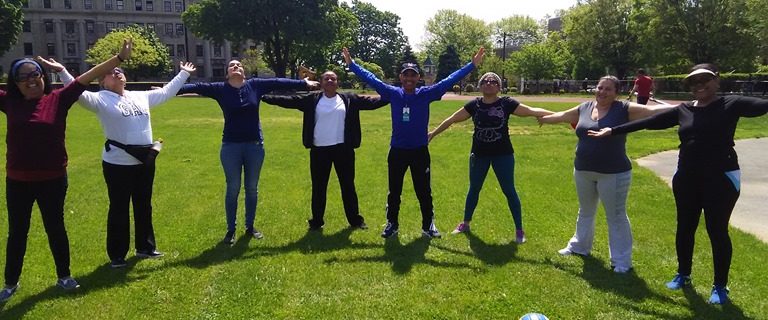Now in its 21st year, Bronx Community Health Network (BCHN) serves more than 108,000 patients annually through its 18 federally qualified community and school-based health centers throughout the Bronx. BCHN’s sponsored health centers provide the full range of health care including pediatrics, adult care, vision, dental and behavioral health, as well as preventive services such as health screenings, smoking cessation programs, healthy eating and exercise classes, and other community supports.
In keeping with its mission to improve the health of people and families in the Bronx, BCHN has spearheaded several programs to connect community members to high quality health care, regardless of their ability to pay. In addition to its health center services, BCHN’s signature Community Health Promotion and Education Program (CHPEP) focuses on disease prevention, early treatment, and healthy lifestyles for community members.
The CHPEP team—comprised of community health workers (CHWs), emergency department (ED) liaisons and patient navigators—addresses some of the common health issues facing many Bronx residents, including asthma, cardiovascular disease and diabetes, by linking them with preventive programs, social services or, if necessary, medical care. Most recently, the addition of a robust community health worker (CHW) program has enhanced how clinical and community resources can be linked to address patient’s medical and social service needs.
Recently, BCHN community health worker, Aminatta Ulaba-Samura, met with Denie, a patient at Montefiore’s Family Health Center who was struggling to pay for food. Aminatta connected Denie to a SNAP eligibility counselor, resulting in an increase in her SNAP benefit from $16 per month to $357 per month. Denie’s glowing letter of thanks was a testament to BCHN’s high levels of patient satisfaction.
The health centers in BCHN’s network serve medically underserved neighborhoods where patients tend to face challenges with housing, employment, food, health insurance and legal needs. At BCHN, CHWs are core members of the patient-centered medical home (PCMH) care team, allowing patients like Denie to have all of their needs addressed.
A PCMH is led by a personal primary care provider, who works collaboratively with a team of health professionals to communicate and coordinate a patient’s care to maximize their health outcomes. This care is also facilitated by sharing information through registries, information technology and health information exchanges.
“BCHN takes every patient’s needs and challenges very seriously,” says Eleanor Larrier, CEO. “Our CHWs, patient navigators and ED Liaisons take time to explain the options to our patients and clients, address their needs through linkages and referrals, and address their fears in a culturally and linguistically competent manner. The feedback from patients has been very positive.”
Many people served by BCHN lack the knowledge about free or low-cost health insurance options and other resources available or assume they wouldn’t qualify. Others worry about the financial burden of health insurance or the impact of sharing their immigration status.
BCHN is one of Bronx Partners for Healthy Communities’ (BPHC) seven “Community Health Literacy” program partners, working to connect people to health insurance, local primary care providers and other services. For this initiative and others, BCHN uses its specially-trained CHPEP team, who are certified to enroll eligible individuals into a health care plan through the NYS Marketplace (Certified Application Counselors). In 2015, the team engaged and empowered 33,000 underserved people in the Bronx; and conducted 569 group health education sessions in libraries, churches, schools, laundromats and senior citizen centers. Fifty-six percent of the outreach encounters led to a referral.
To expand its reach, BCHN is working with its network of more than 100 community partners, providing education and technical assistance on health insurance, the Affordable Care Act application process, options for healthy living, and disease prevention and management.
“Joining BPHC has given us an opportunity to collaborate with partners on DSRIP, mobilize our resources and work toward a shared goal that is positive and measurable,” said Larrier.
(published February 9, 2017)
